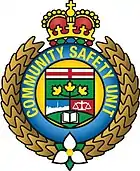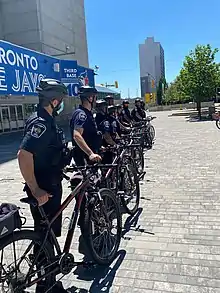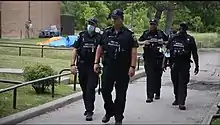Toronto Community Housing
Toronto Community Housing Corporation (TCHC) is the public housing agency in Toronto, Ontario. A municipal corporation of the City of Toronto, TCHC provides approximately 60,000 units of housing to an estimated 165,000 residents, making it is the second-largest housing provider in North America (behind the New York City Housing Authority).[1] TCHC owns more than 2,100 buildings, including high, mid, and low-rise apartments, townhomes and houses.[2] TCHC is wholly owned by the municipal government, with its operating funding coming from rental payments, subsidies from the city, and other income. Tenants pay rent according to their income, with some buildings having a mix of tenants paying market-level rents while others pay subsidized rates.
 | |
| Agency overview | |
|---|---|
| Formed | January 1, 2002 |
| Preceding agency |
|
| Type | Municipally owned corporation |
| Headquarters | 931 Yonge Street Toronto, Ontario |
| Employees | 1,700 |
| Annual budget | $401.5 million (2018) |
| Agency executives |
|
| Parent organization | City of Toronto |
| Website | www |
History
Through the latter half of the 20th century, prior to the amalgamation of Toronto in 1998, there were three municipally owned and operated affordable housing providers, each operated by a different level of government under the former municipal federation of Metropolitan Toronto, including Metro itself, the former City of Toronto, and the Government of Ontario. These housing providers included the Metropolitan Toronto Housing Company Ltd. and the City of Toronto Non Profit Housing Corporation, also known then as Cityhome.
In 1998, as part of a sweeping re-organization of the provincial government under Premier Mike Harris, housing was downloaded to local municipalities to administer. The Metropolitan Toronto Housing Corporation (MTHC) was formed to take over provincial public housing units in the municipality. The existing companies, including Cityhome and the Metro municipal housing authorities, were merged into the Toronto Housing Company (THC). The forced amalgamation of the federation of municipalities under Metropolitan Toronto, including its affordable housing providers, was also carried out with the forced downloading of operating and capital expenses for a number of public services, including affordable housing. The then provincial government under Harris promised that the downloading of expenses would be revenue neutral, but that turned out to be not true, which contributed a great deal to the existing repair backlog now faced by city housing.
In 2002, four years after the forced amalgamation of Toronto, MTHC merged with THC to form the new Toronto Community Housing Corporation (TCHC) to administer all public housing units within the merged City of Toronto.[2] As the dust settled on amalgamation, focus shifted to creating the then newly amalgamated city's first official plan, which included identifying key areas in need of revitalization. These became known as the priority neighbourhoods, leading to among other things the unveiling of the suburban light rail plan Transit City, and the early stages of planning for Toronto Community Housing's first new development, the revitalization of Regent Park. On February 14, 2006, demolition work began on Regent Park, shortly followed by the completion of the new neighbourhood's first building in 2008.
In October 2008, TCHC was named one of "Canada's Top 100 Employers" by Mediacorp Canada Inc., and it was featured in Maclean's newsmagazine. Later that month, TCHC was also named one of Greater Toronto's Top Employers, which was announced by the Toronto Star newspaper.[3]
On April 8, 2010, TCHC tenants between 14 and 28 years of age went to the polls to vote in the inaugural youth tenant election at locations across the city. Over a two-year term, elected youth tenant representatives will sit on youth councils that will have a say on capital priorities and planning in their communities. They will engage youth and work with staff to make things work better at the community level.
Housing sites
TCH has various properties from individual sites (single dwelling to apartment complex) within existing neighbourhoods to housing projects. The two largest TCH housing project communities are:
Community Safety Unit
| Community Safety Unit | |
|---|---|
 | |
| Motto | Working Together for Safer Communities |
| Agency overview | |
| Formed | 2002 (as Special Constables) |
| Jurisdictional structure | |
| Legal jurisdiction | Police officer status on, or in relation to, TCHC property |
| Operational structure | |
| Sworn members | 196 |
| Unsworn members | 15 |
| Elected officer responsible | |
| Agency executives |
|
| Facilities | |
| Stations | West District, Central District, East District, CSU Headquarters |
| Website | |
| Official website | |
History

The Community Safety Unit (CSU) is the corporate security and law enforcement agency of Toronto Community Housing Corporation. TCHC first established a protective service as contracted security guards in the mid 1980s until 1990. Soon after, the security firm was taken in-house and adopted a corporate security model under the then ‘MTHA’ (Metro Toronto Housing Authority). In 1995, MTHA secured Provincial Offences Officer (PO) designation for its in-house security personnel. It was then a hybrid of internal staff and contracted third party security services. However, only in-house security personnel could hold PO designation. Provincial Offences Officers status allowed the staff to issue provincial tickets, and (provincial) court summonses to cooperative trespassers. This is to avoid arresting them, and awaiting Toronto Police Service to release a person from custody.
In the year 2000, MTHA evolved into TCHC (today's corporation). With this, the City of Toronto and Toronto Police Service launched a pilot project to create Special Constables in TCHC on March 8, 2000. These Special Constables were sponsored and sworn in by the Toronto Police Service. The pilot project was deemed a success and most in-house security guards became sworn peace officers (Special Constables).[4] In 2015 the CSU launched a new deployment model creating faster response times and greater community engagement. This was the first step taken towards a more policing model in the community to combat the increasing violent crime and drug trafficking taking place within and in relation to TCHC properties. In 2017 the Toronto Police Services board approved the expansion of the Community Safety Unit (CSU) [5]
Currently the CSU consists of approximately 192 (and approved for a complement of 300) special constables making it the largest (independent) special constable agency in Canada.[6] The CSU is larger than some police services in Canada and statistically deals with more investigative and criminal code enforcement than many rural police services in the province of Ontario.[7] The CSU went under a rapid progression to a law enforcement model under their new Chief Special Constable William (Bill) Anderson (a former Peel Regional Police and Hamilton Police Service Staff Sergeant) in 2018. Many initiatives were brought in such as the Violence Reduction Program (VRP).[8] The VRP was introduced as a tool to counteract the extreme increase in violent crime in the city of Toronto. This project was backed and applauded by both Toronto City Council and the Toronto Police Service[9][10][11]
Chief Bill Anderson retired in September 2021 and was replaced by Deputy Chief Al Britton in the interim.[12]
TCHC special constables have police powers bestowed to them under the Police Services Act by Toronto Police Service on or in relation to Toronto Community Housing property [13] and have the ability to enforce legislation from the: Criminal Code of Canada, Controlled Drugs and Substances Act, Mental Health Act, Liquor Licence Act, Trespass to Property Act, and Provincial Offences Act.[14]
Operations
The Community Safety Unit operates in the following capacities:
- Provincial Offences Officers (Parking Enforcement)
- Special Constables (Patrol Units and Violence Reduction Program Neighbourhood Officers)
- Community Safety Advisors (Address community safety meetings and issues with tenants)
- Field Intelligence Officers (Intelligence gathering working with Toronto Police Service)
- Access Control (FOB access and access monitoring in all TCHC buildings)
- ITS (Information technology including operating and downloading CCTV footage)
Fleet


- Ford Taurus Police Interceptor Sedans (Marked & Unmarked)
- Dodge Charger (LD) Police Pursuit Hemi V8/AWD
- Ford Explorer Police Utility Interceptors (Marked & Unmarked)
- Ram 1500 ST Pick Up Command Truck
All Special Constable scout cars (or alternatively known as cruisers) are equipped with amber, red, and white emergency lighting. Several Taurus', Dodge Chargers, and the Ram 15000 command truck are equipped with a Havis, Inc. LED light bar. While others in the fleet (slick tops) have internal 'hidden' lighting that appear only when in operation. The vehicle's equipped with the light-bar also feature high bright take down and alley lights.
Command Officers and Field Intelligence Officers use unmarked Grey "stealth" scout cars (two Ford FPIU and one Ford FPI). The stealth vehicle's feature 'hidden' Havis LED lighting systems as well as sirens and air horns. They are also all equipped with prisoner transport divider and back seats.
All special constable vehicles are also equipped with sirens and air horns. The interiors are equipped with prisoner transport dividers and seating for 2 in custody. CSU Special Constables are authorized to execute warrants, and place persons under arrest under their authorities. They also transport the prisoners to a Toronto Police Service Division for processing and holding. They also transport individuals apprehended for Mental Health purposes to local hospitals.
The Ford FPIU door panels offer ballistic protection.[17] The Ford FPIU (Explorers), Dodge Chargers and several Ford FPI (Taurus) also are equipped with push-bars.
The vehicle's are maintained by the City of Toronto Fleet Services.[18] And the new (2020) Ford FPIU (Explorer) scout cars are Hybrid vehicle's.[19]
The CSU previously used Chevrolet Impala's, Toyota Camry, and Ford Escape before being phased out in late 2019. CSU Parking Enforcement is slated to receive new Hybrid Ford Escape's in Q2 2022.
Ranks

- Special constable (Patrol)
- Corporal (Training, Intelligence and Logistics)
- Sergeant (Patrol / Administrative / Training and Logistics)
- Staff sergeant (Patrol / System Security / Administrative / Training and Logistical Support)
- Inspector (Currently Unused)
- Deputy Chief Special Constable (Operations and Administrative)
- Chief Special Constable
Controversies
2011 Audit report controversy
Toronto Auditor General Jeffery Griffiths conducted audits of TCHC procurements and employee expenses from January 1, 2009, through June 30, 2010, reporting his findings in two separate reports on December 7, 2010. His report on employee expenses revealed a list of inappropriate expenses incurred by TCHC as a result of staff abusing the organization's funds for personal interest. Examples include a $1,850 boat cruise for "staff development", $1,925 for manicures and pedicures, $6,000 for a planning session in Muskoka, $53,500 for a 2008 staff party, $40,000 for a staff Christmas party in 2009, and $800 to provide massages at a staff picnic.[20][21] Frequently deemed the most offensive of all the expenses by media figures, social advocates, and TCHC residents alike was the purchase of chocolates from luxury department store Holt Renfrew at a cost of $1,000.[22]
The procurement audit found that procurement policy and procedures adopted by the TCHC board of directors were sometimes ignored. For instance, an open tendering process was sometimes not used when it should have been, the tendering process was not always transparent, and purchase orders were sometimes split to circumvent procurement procedures. Several cases of single tendering were deemed inappropriate, including one case of a potential conflict of interest not declared in writing and one case of nearly $25 million in work awarded to an unsolicited proposal without competition from other vendors. The report also criticized TCHC for bypassing the formal requirement that bidders make deposits—a requirement that protects the TCHC should a bidder fail to meet its contractual obligations—and for its documentation inadequately supporting some cases of single tendering.[21][23]
Toronto Mayor Rob Ford demanded the resignation of the board of TCHC and although they were initially defiant, by March 3, 2011, all board members had resigned. The board was then replaced on a temporary basis by former city councillor Case Ootes.[24] Ford demanded the resignation of TCHC CEO Keiko Nakamura who initially refused to step down.[24] Toronto land development agency Build Toronto removed its CEO Derek Ballantyne who had been previously the CEO of TCHC.[24] Ford called for the privatization of Toronto Community Housing Corporation. The feasibility of the privatization of TCHC was greeted with widespread scrutiny and skepticism; many housing and business experts felt that Ford underestimated the complexity of such a transition.[25] TCHC CEO Nakamura resigned after a fire in a complex on Wellesley Street, and was replaced by Len Koroneos, selected by Ford.[26]
Jones hiring
On June 18, 2012, Eugene Jones Jr. took over as president and CEO of TCHC. Jones has over 30 years of experience working in the U.S. public housing sector, most recently as the executive director of the Detroit Housing Commission.[27]
Backlog of housing repairs
Since TCHC was formed in 2002, it has compiled a list of needed repairs to its buildings. By 2013, TCHC estimated it had a $751 million backlog of repairs to its buildings.[28] In 2011, TCHC initiated a program of selling off units and other assets with the proceeds to be put towards needed repairs. 65 units were approved for sale by Ontario, and Toronto City Council approved the sale of a further 55 units in October 2012.[28]
2013 Eviction scandals
In 2013, the City of Toronto Ombudsman released a report about TCHC eviction policy and evictions in 2011 and 2012. The report was sparked after the death of a senior evicted from TCHC in 2011, who died one month after being evicted. Len Koroneos, CEO during the period studied, focussed on rent collection, stating that “Good eviction prevention programs cannot be implemented at the expense of rent collection.”[26] The TCHC Board adopted the recommendations of the Ombudsman.
2013 Fraudulent billing
Five employees were fired after an investigation into fraudulent billing found evidence of wrongdoing. The investigation involved a former subsidiary Housing Services Inc., and its work on the TCHC project at 200 Wellesley Street East, after it had been damaged by fire. The file was turned over to Toronto Police for further investigation.[29]
Arms
|
References
- "Beyond the crisis: Fresh ideas on public housing". The Star. Toronto. March 4, 2011.
- "About Us". Toronto Community Housing Corporation. Retrieved June 5, 2013.
- "Reasons for Selection, 2009 Canada's Top 100 Employers Competition".
- "Our special constables". www.torontohousing.ca. Retrieved Sep 5, 2021.
- Toronto Community Housing (Oct 26, 2018). "Toronto Community Housing swearing-in ceremony highlights partnership with the Toronto Police Service". GlobeNewswire News Room (Press release). Retrieved Sep 5, 2021.
- https://tpsb.ca/component/jdownloads/send/59-2021/697-july-29
- Lavoie, Joanna (Aug 20, 2020). "Loaded gun, fentanyl recovered in downtown Toronto arrest". Toronto.com. Retrieved Sep 5, 2021.
- https://www.torontohousing.ca/events/Documents/TSC/Oct%207%202019/Item%207%20-%20TSC%20Confidential%20Agenda%20Item%202019%20-%20VRP%20update%20July%20V4%20-%20final.pdf
- Draaisma, Muriel (August 14, 2019). "Toronto police chief unveils 'intelligence-led' plan to curb gun violence". CBC News.
- "TCHC wants more special constables so it can curb killings". Toronto Sun. Retrieved September 5, 2021.
- Smee, Michael (December 17, 2018). "TCH wants big boost in roster of special constables". CBC News.
- "Brian Lass on LinkedIn: #retirement #police #lawenforcement | 14 comments".
- "Ontario Special Constable Association | Special Constables in Ontario".
- "Safety and security".
- Archived at Ghostarchive and the Wayback Machine: "CSU: A day in the life of". YouTube.
- Archived at Ghostarchive and the Wayback Machine: "CSU takes part in motorized parade to salute health-care workers". YouTube.
- "Ford Police Interceptor Offers Bulletproof Door Panels". Archived from the original on 2018-12-16.
- "Fleet Services – City of Toronto". 26 September 2017.
- "2020 Ford Police Interceptor Utility Hybrid AWD Saves Fuel, Hauls Ass". 17 May 2019.
- Jeffrey Griffiths (2010-12-07), Toronto Community Housing Corporation – Controls Over Employee Expenses Are Ineffective (PDF), Toronto Auditor General's Office.
- Executive Committee Agenda Item 2011.EX5.12, Toronto City Council, 2011-04-20.
- Fiorito, Joe (February 26, 2011). "Fiorito: TCHC Audit Reveals Lavish Spending". Toronto Star.
- Jeffrey Griffiths (2010-12-07), Toronto Community Housing Corporation – Procurement Policies and Procedures Are Not Being Followed (PDF), Toronto Auditor General's Office.
- Mehler Paperny, Anna (March 11, 2011). "Derek Ballantyne leaves as chief operating officer; formerly served as CEO of Toronto Community Housing Corporation". The Globe and Mail. Toronto, ON.
- Baluja, Tamara (March 7, 2011). "Tenants angered by Ford's comments on privatizing social housing". The Globe and Mail. Toronto, ON. Retrieved June 6, 2013.
- Fiorito, Joe (June 10, 2013). "Eviction of seniors from community housing happening under Toronto Mayor Rob Ford's watch: Fiorito". Toronto Star.
- Alcoba, Natalie (July 28, 2012). "I don't operate this agency from behind the desk': New head of TCHC aims to restore credibility". National Post. Toronto, ON. Retrieved August 8, 2012.
- "About Toronto Community Housing's State of Good Repair Program". Toronto Community Housing Corporation. Archived from the original on June 18, 2013. Retrieved June 5, 2013.
- Chown Oved, Marco; Dale, Daniel (October 8, 2013). "TCHC fires five after finding 'evidence of wrongdoing'". Toronto Star.
- "Toronto Community Housing Corporation". Canadian Heraldic Authority. Retrieved 9 January 2022.